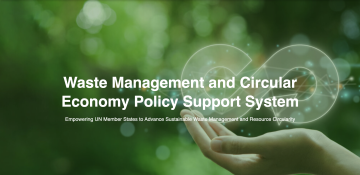
The environmental and social costs of waste and pollution are not equally distributed. Developing countries, particularly those with limited waste management infrastructure, often experience the most severe impacts.
To address these challenges, the Green Growth Knowledge Partnership (GGKP) and the UN Office for Sustainable Development – Department of Economic and Social Affairs (UNOSD-DESA) have teamed up to launch a new Waste Management and Circular Economy Policy Support System (WMPSS). This initiative aims to help UN Member States bridge data, technical, capacity and finance gaps in advancing resource circularity in solid waste management (SWM) through a life-cycle approach.
A global waste crisis – key facts
- Humanity generates an estimated 2.1 billion tons of municipal solid waste (MSW) annually and waste generation could rise by more than 77% by the end of 2050.
- Only 62% of MSW is managed in controlled facilities across the world.
- Approximately 90% of waste in low-income countries is discarded in unregulated dumps or openly burned.
- The waste sector contributes an estimated 20% of human-caused methane emissions – a potent greenhouse gas.
Why this matters
The impact of this crisis disproportionately affects people in vulnerable situations, particularly women and children working informally in waste picking. Low-income countries face particular challenges, with approximately 90% of waste discarded in unregulated dumps or burned openly and limited access to finance to tackle this challenge. This reality highlights the urgent need for national governments to adopt evidence-based policies that accelerate the transition towards a waste-to-resource approach and support sustainable development.
A circular economy – Linking waste and the SDGs
Waste management and resource circularity are closely tied to the Sustainable Development Goals (SDGs). While they directly relate to key targets under the SDGs, in reality, they indirectly impact all 17 SDGs by influencing health, equity and economic opportunities.
However, inadequate data – an example of which can be seen below for SDG Target 12.5 (municipal waste recycled) – underestimates the waste crisis and limits the impact that can be made to practically advance a circular economy.6 Strengthening national systems to track and manage waste effectively is a critical step forward.
About the Waste Management and Circular Economy Policy Support System (WMPSS)
The new policy support tool will strengthen national waste-related data, capacity and policy action for all waste types by providing:
- A self-assessment framework to evaluate and benchmark national progress.
- A user-friendly system to streamline data collection and improve reporting capacity.
- Tailored recommendations to address knowledge gaps and enable evidence-based planning and investment.
The tool will be piloted through regional workshops with national governments and key stakeholders, promoting collaboration and capacity-building for circular economy strategies at the regional level. The testing process will ensure the tool is tailored to countries’ needs, incorporating feedback to enhance its relevance and effectiveness.
Learn more about the WMPSS here, or contact us for more information about the initiative at unosd [at] un.org (unosd[at]un[dot]org).
